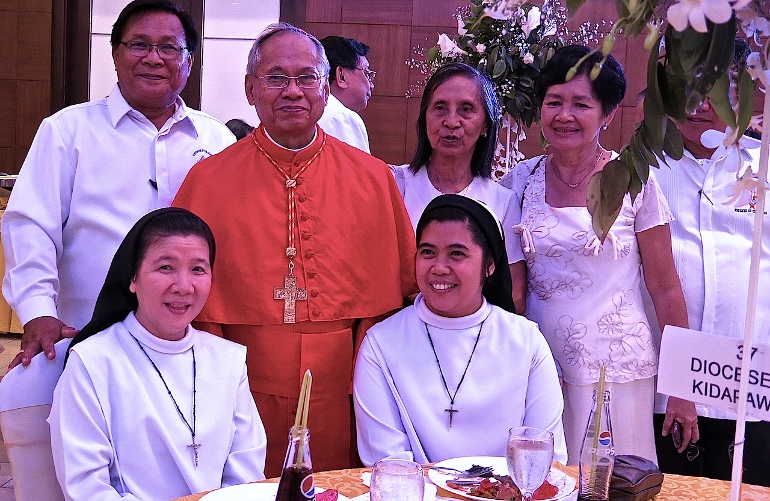
Cardinal Orlando Quevedo poses with Religious of the Virgin Mary nuns and lay guests at 75th birthday testimonial dinner and program in South Seas Mall, Cotabato City, when he announced he was submitting to the nuncio his resignation letter as required by Canon Law. (N.J. Viehland)
People in Asia call Mindanao’s first cardinal, Orlando Quevedo of Cotabato, many names. He calls himself "servant."
"Being cardinal is God's call to greater responsibility and servanthood," Quevedo stressed in his homily for the Mass he led here on Tuesday. The Mass he celebrated with the nuncio Archbishop Giuseppe Pinto, more than 20 bishops, and scores of priests from around the country was in thanksgiving for his 75th birthday, his induction into the College of Cardinals on Feb. 22 in Rome, and various anniversaries of his religious life.
Quevedo, a member of the missionary Oblates of Mary Immaculate, told thousands of people in and outside the heavily-guarded Immaculate Conception Cathedral that his being made cardinal is not an honor for work he has done. He expressed hope that he would be a man of peace in "this broken land." He also would like to “promote harmonious relationship, not only among Mindanao's tri-peoples, but also people of other faiths.”
Mindanao's population, nearly a fourth of the country's 92.34 million people, is predominantly Christian, Muslim and Lumad, the collective name for indigenous peoples with their own beliefs, but there are smaller groups of Buddhists and other religious groupings.
President Benigno Aquino attended the Mass with Christian and Muslim government officials, including Presidential Adviser on the Peace Process Teresita Deles. Before it started, he invited Quevedo to Malacanang Palace in Manila on March 27 for the signing of government’s peace agreement with the Moro Islamic Liberation Front (MILF), the country’s largest Muslim rebel force.
Quevedo in his homily said he did not know why Pope Francis chose him to be cardinal. It could be because he is Archbishop of Cotabato and "Cotabato is a chosen place," he continued. The cardinal appealed for support in addressing problems in the archdiocese: poverty, conflict between rebels and the military, flooding and other disasters, and strained relations among people of various faiths.
Symbol of Pope Francis
Long-time missionary and peace advocate in Mindanao, Claretian Fr. Angel Calvo believes Quevedo’s creation as cardinal is “recognition of the pastoral vision of a bishop who has been the most articulate, and who was the first Secretary General of FABC (Federation of Asian Bishops' Conferences) to have demonstrated and committed himself to that style, very much the style of Pope Francis.”
FABC is a voluntary association of bishops' conferences in Asia, established to foster among members solidarity and co-responsibility for the welfare of church and society in the region.
Asian bishops voted Quevedo to its highest office, which he served from 2005 to 2013.
“I think no matter what diocese in Mindanao Quevedo was in, he would have been chosen because he demonstrated the attitude and leadership Pope Francis has been showing and talking about,” Calvo told NCR in a telephone interview from his base in Zamboanga City, southwest of Cotabato.
The Spanish missionary who heads Zamboanga-Basilan Integrated Development Alliance, called Quevedo a “symbol of Pope Francis in Mindanao.”
Quevedo, he said, “is like Francis in leading by example, using his interaction with people to teach about peace and justice, and sticking to a position he believes is just and right, even when it is unpopular.”
For example, Quevedo “can articulate very clearly and with full conviction and commitment what many in the Philippine church failed to recognize in the decades of armed conflict in Mindanao – that the conflict is rooted in injustice that was done to the Moro (Muslim Filipino) people when migrants and missionaries started settling in certain places in the south, and that it needs to be rectified to achieve peace.”
Calvo pointed to Quevedo’s much cited paper titled Injustice: The Root of Conflict in Mindanao as evidence.
Francis’ selection of Quevedo, he added, brings great affirmation “for me and for those who are striving and working for peace in Mindanao with the same frame of mind.”
In recent festivities here, Quevedo grabbed the chance to appeal for collaboration. At the city government’s dinner on the eve of his birthday, the cardinal invited the hundreds of government officials and employees, their families, church members and guests to collaborate with him on his objectives of peace, harmony and development in Mindanao.
"The goal is that prejudices and biases will be removed effectively in daily practices, in our own thoughts and our own minds,” the cardinal said.
He warned that, "Even if a peace agreement is signed, if these biases and prejudices persist, they can evolve into open conflict, maybe not armed conflict, but conflict in politics, business, and in daily life."
Inspiration for Filipinos
Aquino speaking after communion the following day called the cardinal an inspiration for the Christian faith and those who serve. The cardinal is admired by the people for fighting the "dictatorship" of former President Ferdinand Marcos even though Quevedo was born in Marcos' bailiwick known as the “Solid North,” the president said.
He thanked Quevedo for his unwavering fight against oppression and abuses and called the cardinal “ally of the government” in its decades of on-and-off peace negotiations for a peace pact with MILF rebels who initially fought to establish an independent Islamic state in their claimed territory.
Quevedo “is one with us in believing that sincere and peaceful dialogue will end decades of violence that has claimed so many lives and has triggered suffering among our people," Aquino said.
Addressing Quevedo, he said, “Because of people like you, we are strengthened in our confidence to continue our agenda of wide-ranging reform.”
Powerful voice for interreligious dialogue
In the experience of Amina Rasul, lead convener of the NGO Philippine Council for Islam and Democracy (PCID), Quevedo has been reasonable and consistently advocating peace during discussions about peace negotiations between the government and MILF.
In comments sent to NCR, she said Quevedo would be a "valuable member of the College of Cardinals" as "a religious leader who spends time studying military, political and legal issues as well as Islamic concerns because these impact on the welfare of his flock."
Rasul believes Quevedo will be "a powerful voice" not only for peace in Mindanao, "but for mutual understanding between Muslims and Christians all over the world."
Father to Asia's "little flock"
One such place is Kazakhstan, the country in Central Asia that borders Russia, China, Kyrgyzstan, Uzbekistan and Turkmenistan.
In an email response to NCR Archbishop Tomash Peta, president of the Catholic Bishops' Conference of Kazakhstan (KKEK), pointed out that it was under Quevedo's lead as secretary general of the Asian confederation that Kazakhstan's bishops' conference became member.
"It was the FABC which found us, and was caring enough to unite this little flock of Catholics of Kazakhstan and the Central Asia with the brothers and sisters on the Asian Continent. Cardinal Quevedo was of great service in this. From the first time KKEK could feel the brotherly care and benevolence from the FABC."
Describing Quevedo as "a very modest person" who "treated us always like an older brother" or "like a good father to the bishops from Kazakhstan and Central Asia," Peta expressed confidence that as cardinal, "he will now hold us more in his prayers."
Cardinal of the people
While waiting for Aquino to arrive to the cardinal’s birthday Mass at the cathedral, elder men and women and youth from Cotabato’s 31 parishes told NCR they came to celebrate with “the cardinal of the people.”
Pastoral coordinator Eliseo Barte of San Blas parish explained that as archbishop of Cotabato, Quevedo would visit with families in mountain and other remote barrios cut off from regular parish activities that happen in the town center.
Barte said during pastoral visits, Quevedo insisted on sleeping in the barrio instead of near the parish church or even in the chapel where he could be more comfortable and enjoy his privacy.
In one visit in his parish based in Pigcawayan town, he recalled, Quevedo stayed "a long time" in one chapel until it got dark and started raining hard. Instead of having Quevedo walk 30 minutes along a muddy hill to the next chapel scheduled for a visit that evening, parish workers cancelled it.
The next day, Quevedo met with the people who had been waiting at that chapel. They told him how eagerly they had prepared and waited for him.
"Bishop (Quevedo) listened to them, asked their chapel’s location, then walked right on toward that chapel. He asked to see the house where he was supposed to have slept the night before," Barte recalled.
The chapel president took Quevedo to the house.
"He visited with the families in that neighborhood and really lay down and rested in the house. Even if it was just for 10 minutes or so, the family and neighbors were very happy,” Barte recalled.
"Now they feel proud too. They say, ‘Our cardinal slept here in our house.’ He is one with us – the cardinal of the people," the parish worker added.
[N.J. Viehland is NCR’s correspondent in Asia.]




